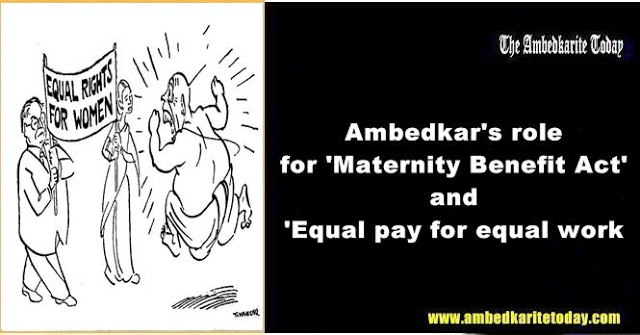Maternity Benefit Act
I don’t know how many Indian women knows the contribution of Revolutionary Dr.Babasaheb Ambedkar’s major role for the Maternity Benefits bill in the Bombay legislature in July, 1928 itself for the factory women workers. In fact it was the first Maternity Benefits Act passed in India in 1929 by the Bombay legislature.
On this regard he said,
“I believe that it is in the interests of the nation that the mother ought to get a certain amount of rest during the pre-natal period and also subsequently. I am prepared to admit this fact because the conservation of the people’s welfare is primarily the concern of the Government. And in every country, therefore, where the maternity benefit has been introduced, you will find that the Government has been subjected to a certain amount of charge with regard to maternity benefit. I think, therefore, the benefits contemplated by this bill ought to be given by this Legislature to the poor women who toil in our factories in this Presidency.”
Subsequently the Madras Maternity Benefit Act was passed by the Madras Legislature Council in 1934 and subsequently in other provinces of India.
As a Labour Minister in the Viceroy executive council between 1942 and 1946, Dr. Babasaheb Ambedkar was instrumental in bringing the Mines Maternity Benefit Bill for women in all over India. Under this act, a woman working in the mine is entitled to maternity benefit for a period of 8 weeks. This period of 8 weeks is divided into two parts of four weeks each, one part preceding delivery and another part succeeding delivery.
Later all the acts of Maternity Benefit of various states were repealed and a common Maternity Benefit Act-1961 was adopted by the Central Government for all states in India.
Equal pay for equal work
Revolutionary Dr. Babasaheb Ambedkar was the first person who brought “Equal pay for equal work irrespective of the sex” in India in terms of Industrial workers as a Labour Minister in the Viceroy executive council.
On this regard he said,
“We have also taken care to see, and this is an important point, that women shall be paid the same wages as men. It is for the first time that I think in any industry the principle has been established of equal pay for equal work irrespective of the sex.”
( In Tamil: “ஆண்களுக்கு அளிக்கப்படும் அதே ஊதியம் பெண்களுக்கு வழங்கப்பட வேண்டும் என்பதில் நாங்கள் கவனமாக இருந்தோம். இது ஒரு முக்கியமான விசியமாகும். பால் பாகுபாடின்றி சம வேலைக்கு சம ஊதியம் என்னும் கோட்பாடு வேறு எந்த தொழிலும் இல்லாதவாறு இத்தொழில்தான் முதல் முறையாக நிலைநாட்டப்பட்டது” )
While drafting the Indian Constitution, Dr. Babasaheb played major contribution for embodied the Article 39(d) relates the state to strive for securing equal pay for equal work of both men and women in the Part IV of the directive principles of the State Policy.
With regards,
Ambeth.,
Dharmapuri,
Tamil Nadu.
Jai bheem…!!!
Long Live Ambedkarism…!!!
Reference:
Dr. Babasaheb Ambedkar Writings and Speeches:
- Volume 2 – Dr. Ambedkar in the Bombay Legislature: Speech, Questions and Debate (1927 to 1939)
- Tamil Volume 18/ English Volume 10 – Dr. Ambedkar as Member of the Governor-General’s Executive Council (1942-1946).

